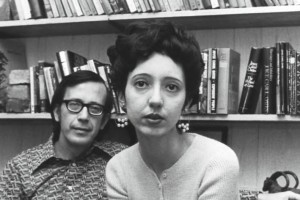 The New Yorker published a beautiful piece by Joyce Carol Oates on the death of her husband, Raymond Smith. Oates and Smith, who had been married 48 years, were in a car accident three years ago. The engine of their car was struck at high impact from the side, and their airbags inflated. Both Oates and Smith walked away from the scene, feeling lucky to be alive.
The New Yorker published a beautiful piece by Joyce Carol Oates on the death of her husband, Raymond Smith. Oates and Smith, who had been married 48 years, were in a car accident three years ago. The engine of their car was struck at high impact from the side, and their airbags inflated. Both Oates and Smith walked away from the scene, feeling lucky to be alive.
But the impact of the airbag had unknowingly damaged Smith’s lungs. Weeks later, feeling weak and feverish, he agreed to go to the emergency room. He was diagnosed with pneumonia, admitted to the hospital, and expected to recover. But a few weeks later, he died unexpectedly of a secondary infection acquired in the hospital.
Oates’ chronicle of the events, from the accident to her husband’s death, is vivid and moving. Especially poignant is her description of driving from her home to the hospital with heightened awareness and care after being informed that Smith had unexpectedly taken a turn for the worse. She arrived moments after his death.
The article is available only with a subscription (or payment), but I learned today that the piece is part a forthcoming book, A Widow’s Story: A Memoir. Oates was interviewed on PBS NewsHour, where she describes the “absurd” state of mind created by the sudden loss of someone so close. It was like losing a part of one’s mind. Or like losing a leg or an arm, and yet continuing to carry on with one’s life.
Here is the PBS interview. Oates relates that she accumulated about 600 pages of journal notes following the death of her husband, some of which she used for the memoir (her original intention was to write a widow’s handbook). She used other parts of her journal to write short stories. Interviewer Jeffry Brown asks Oates if fiction is better for some things, and she says yes. Fiction strikes a resonant chord of universality, which is best done by fiction.
And here is Oates reading from the book. She reads a section that describes what it was like to perform the routine responsibilities of her life – in her case, teaching classes at Princeton – while immersed in the fog of being recently widowed.
Related links:
Should grief be labeled and treated as depression?
Knowing when you’ll die: Tony Judt’s last interview
Atul Gawande: Modern death and dying
Actions surrounding the moment of death are highly symbolic
Death be not visible
Resources:
Image: Ron’s View
Joyce Carol Oates, A Widow’s Story, The last week of a long marriage, The New Yorker, December 13, 2011
Joyce Carol Oates, A Widow’s Story: A Memoir
Tom LeGro, Thursday’s NewsHour: Joyce Carol Oates Tells ‘A Widow’s Story’, PBS NewsHour, February 3, 2011


Sorry, comments are closed for this post.